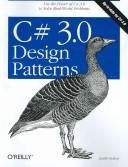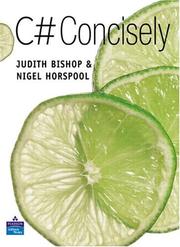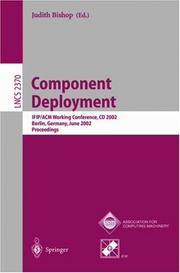| Listing 1 - 10 of 12 | << page >> |
Sort by
|

ISBN: 9780596527730 059652773X 0596519478 0596551444 Year: 2007 Publisher: O'Reilly Media, Inc.
Abstract | Keywords | Export | Availability | Bookmark
 Loading...
Loading...Choose an application
- Reference Manager
- EndNote
- RefWorks (Direct export to RefWorks)
Describes the features of the programming language C# 3.0 and object-oriented design patterns.
C# (Computer language). --- C# (Computer program language). --- C# (Langage de programmation). --- Logiciels --- Software patterns. --- Modèles de conception. --- Information Technology --- General and Others
Digital
ISBN: 9783642219528 Year: 2011 Publisher: Berlin, Heidelberg Springer Berlin Heidelberg
Abstract | Keywords | Export | Availability | Bookmark
 Loading...
Loading...Choose an application
- Reference Manager
- EndNote
- RefWorks (Direct export to RefWorks)
Mathematical logic --- Logic --- Computer science --- Programming --- Computer architecture. Operating systems --- Computer. Automation --- ontwerpen --- programmeren (informatica) --- programmeertalen --- wiskunde --- software engineering --- computernetwerken
Book
Abstract | Keywords | Export | Availability | Bookmark
 Loading...
Loading...Choose an application
- Reference Manager
- EndNote
- RefWorks (Direct export to RefWorks)

Abstract | Keywords | Export | Availability | Bookmark
 Loading...
Loading...Choose an application
- Reference Manager
- EndNote
- RefWorks (Direct export to RefWorks)
Book
Year: 2006 Publisher: South Africa : South African Institute for Computer Scientists and Information Technologists,
Abstract | Keywords | Export | Availability | Bookmark
 Loading...
Loading...Choose an application
- Reference Manager
- EndNote
- RefWorks (Direct export to RefWorks)
Book
Year: 2005 Publisher: Pretoria, Republic of South Africa : South African Institute for Computer Scientists and Information Technologists,
Abstract | Keywords | Export | Availability | Bookmark
 Loading...
Loading...Choose an application
- Reference Manager
- EndNote
- RefWorks (Direct export to RefWorks)
This is the 20th Annual conference of South Africa's Institute of Computer Scientists and Information Technologists. It is thus fitting to reflect a bit on our history. In 1982, twelve good men and true (including one woman) got together over a (few) bottles of wine and decided to form a scientific body dedicated to promoting the interests of computing research in this country. The people were:Stef Postma (RAU), Judith Bishop (Wits), Pierre Visser, Gideon De Kock (UPE), Niek du Plooy (CSIR), Doug Laing (IBM), Ken MacGregor (UCT), Phil Roets (NRIMS), Trevor Turton (IBM), Gerrit Wiechers (UNISA), Trevor Winer, Roelf van den Heever (UP) and Derrick Kourie (UP).The enduring legacy of this group of legends in computing has been the SA Computer Journal, and the Annual SAICSIT conference. Each year the conference chair chooses a theme for the conference, and this year "Research in a changing world" aptly sums up where we are now, and where we want to be. We live in a world of rapid technological, economic and social change, and to foster world class research in this environment is both the Institute's aim and challenge. Fittingly, this year's conference was marked by several real changes.Paper submission and entry were handled by the conference system. 60 submissions were received and 30 full papers were chosen after a stringent refereeing process which involved three referees per paper from an internationally representative programme committee, plus an online discussion to select the top papers, and a second round of checking that the referees' comments had been adhered to. For many on both sides of refereeing, such care and control was quite new, and I salute everyone who adapted so easily to the system --- the 22 members of the IPC, the 34 members of the Review Panel, and the over 150 authors. In particular, thanks are due to Dirk Peters of the University of Leipzig, who ran the Paperdyne system with such technical efficiency and user-friendly support.Then we did away with the "short paper" category, as well as the student paper day, instituting instead a poster session. Ten posters were received, and they were all reviewed and accepted.
Book
ISBN: 3642219519 3642219527 Year: 2011 Publisher: New York : Springer,
Abstract | Keywords | Export | Availability | Bookmark
 Loading...
Loading...Choose an application
- Reference Manager
- EndNote
- RefWorks (Direct export to RefWorks)
This book constitutes the refereed proceedings of the 49th International Conference on Objects, Models, Components, Patterns, held in Zurich, Switzerland, in June 2011. The 19 revised full papers presented together with the abstracts of 2 invited papers were carefully reviewed and selected from a total of 68 submissions. The papers discuss all aspects of object technology and related fields, in particular model-based development, component-based development, language implementation and patterns, in a holistic way. The conference has a strong practical bias, without losing sight of the importance of correctness and performance.
Engineering & Applied Sciences --- Computer Science --- Information Technology --- Software Engineering --- Object-oriented programming (Computer science) --- Computer science. --- Computer communication systems. --- Computer programming. --- Software engineering. --- Programming languages (Electronic computers). --- Computer logic. --- Mathematical logic. --- Computer Science. --- Software Engineering. --- Logics and Meanings of Programs. --- Programming Languages, Compilers, Interpreters. --- Programming Techniques. --- Mathematical Logic and Formal Languages. --- Computer Communication Networks. --- Algebra of logic --- Logic, Universal --- Mathematical logic --- Symbolic and mathematical logic --- Symbolic logic --- Mathematics --- Algebra, Abstract --- Metamathematics --- Set theory --- Syllogism --- Computer science logic --- Logic, Symbolic and mathematical --- Computer languages --- Computer program languages --- Computer programming languages --- Machine language --- Electronic data processing --- Languages, Artificial --- Computer software engineering --- Engineering --- Computers --- Electronic computer programming --- Electronic digital computers --- Programming (Electronic computers) --- Coding theory --- Communication systems, Computer --- Computer communication systems --- Data networks, Computer --- ECNs (Electronic communication networks) --- Electronic communication networks --- Networks, Computer --- Teleprocessing networks --- Data transmission systems --- Digital communications --- Electronic systems --- Information networks --- Telecommunication --- Cyberinfrastructure --- Network computers --- Informatics --- Science --- Programming --- Distributed processing --- Logic design. --- Design, Logic --- Design of logic systems --- Digital electronics --- Electronic circuit design --- Logic circuits --- Machine theory --- Switching theory
Book
ISBN: 9783642219528 Year: 2011 Publisher: Berlin Heidelberg Springer Berlin Heidelberg
Abstract | Keywords | Export | Availability | Bookmark
 Loading...
Loading...Choose an application
- Reference Manager
- EndNote
- RefWorks (Direct export to RefWorks)
This book constitutes the refereed proceedings of the 49th International Conference on Objects, Models, Components, Patterns, held in Zurich, Switzerland, in June 2011. The 19 revised full papers presented together with the abstracts of 2 invited papers were carefully reviewed and selected from a total of 68 submissions. The papers discuss all aspects of object technology and related fields, in particular model-based development, component-based development, language implementation and patterns, in a holistic way. The conference has a strong practical bias, without losing sight of the importance of correctness and performance.
Mathematical logic --- Logic --- Computer science --- Programming --- Computer architecture. Operating systems --- Computer. Automation --- ontwerpen --- programmeren (informatica) --- programmeertalen --- wiskunde --- software engineering --- computernetwerken

ISBN: 3540438475 9783540438472 3540454403 Year: 2002 Publisher: Berlin, Heidelberg : Springer Berlin Heidelberg : Imprint: Springer,
Abstract | Keywords | Export | Availability | Bookmark
 Loading...
Loading...Choose an application
- Reference Manager
- EndNote
- RefWorks (Direct export to RefWorks)
Deployment is the act of taking components and readying them for productive use. There may be steps following deployment, such as installation or m- agement related functions, but all decisions about how to con?gure and c- pose/assemble a component are made at the deployment stage. This is therefore the one opportunity in the software lifecycle to bridge the gap between what the component developer couldn’t know about the deployment environment and what the environment’s developer couldn’t know about the open set of depl- able components. It is not surprising that deployment as a dedicated step gains importance when addressing issues of system-wide qualities, such as coping with constrained resources or preparing for component adaptation and system evolution. Yet, component deployment is still a discipline in its infancy: it became mainstream practice only in the mid 1990s. Much of the best practice impulse originated in products like Microsoft’s Transaction Server and its approach to attribute-based programming and later products like Enterprise JavaBeans and now the Corba Component Model. All these address the speci?c needs of enterprise appli- tion servers. However, the potential of the deployment concept goes far beyond this. Deployment can and should touch e?ectively all truly component-based solutions. The proceedings of Component Deployment 2002 represent a good cro- section of the gamut of deployment issues. From customization to address - source constraints to recon?guration of deployed systems and from architecture to design to languages, the avid reader will ?nd some contribution.
Component software --- System design --- User interfaces (Computer systems) --- Computer software --- Computer science. --- Architecture, Computer. --- Software engineering. --- Computer programming. --- Programming languages (Electronic computers). --- Computer logic. --- Computer Science. --- Software Engineering. --- Computer System Implementation. --- Software Engineering/Programming and Operating Systems. --- Logics and Meanings of Programs. --- Programming Languages, Compilers, Interpreters. --- Programming Techniques. --- Computer science logic --- Logic, Symbolic and mathematical --- Computer languages --- Computer program languages --- Computer programming languages --- Machine language --- Electronic data processing --- Languages, Artificial --- Computers --- Electronic computer programming --- Electronic digital computers --- Programming (Electronic computers) --- Coding theory --- Computer software engineering --- Engineering --- Architecture, Computer --- Informatics --- Science --- Programming --- Computer network architectures. --- Logic design. --- Design, Logic --- Design of logic systems --- Digital electronics --- Electronic circuit design --- Logic circuits --- Machine theory --- Switching theory --- Architectures, Computer network --- Network architectures, Computer --- Computer architecture --- Computer architecture. --- Programming languages (Electronic computers)
Book
ISBN: 1450322956 Year: 2014 Publisher: [Place of publication not identified] ACM
Abstract | Keywords | Export | Availability | Bookmark
 Loading...
Loading...Choose an application
- Reference Manager
- EndNote
- RefWorks (Direct export to RefWorks)
| Listing 1 - 10 of 12 | << page >> |
Sort by
|

 Search
Search Feedback
Feedback About UniCat
About UniCat  Help
Help News
News